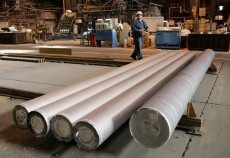 Business & Finance Club Magazine - Industrial Sector - Doha -- With global aluminium prices expected to hold at the $2,000 (Dh7,346) a tonne-plus level through the year, Qatar's newly commissioned giant smelter is aiming to make a perfect pitch.
It was last month that the $5.7 billion Qatalum plant was formally commissioned with an annual installed capacity of 585,000 metric tonnes of premium quality aluminium ingots.
Since then, shipments have already been made to clients in Europe, Southern Asia and the Far East, as well as to Saudi Arabia.
In fact, Qatalum which expects to touch peak production before the year is out sees a significant buildup in its prospects among a regional clientele over the medium term.
"Certainly, the growth of regional markets especially in the construction industry is fuelling and increasing the appetite for aluminium," said Jan-Arve Haughan, Qatalum chief executive officer.
"If the demand exists in Qatar, Qatalum, with the strategic help of our partners Qatar Petroleum and Hydro, could meet that demand as we are ideally located to do so."
Infrastructure-led project activity continues to tick along nicely in Qatar and much the same can be said about Saudi Arabia.
Global dominance
If all goes according to the script, it will not be long before Qatalum takes its place alongside regional entities Dubal and Bahrain's Alba as a global player in value-added aluminium products.
Given the capacity of 585,000 tonnes a year, the plant already has the scale to make it happen.
To get its output to a widest possible audience, Qatalum can call on help from Norsk Hydro, the Norwegian supplier of aluminium and aluminium products and a shareholder (along with Qatar Petroleum) in the Qatari smelter.
It was in 2006 that Qatalum was established as a joint venture between Qatar Petroleum and Hydro.
While "Asia and the greater Middle East, together with Europe and North America, form our main target markets for the near future, Hydro is in the process of setting up a regional sales office in Doha to cover the Middle East, Gulf states and southern Africa," Haughan said.
This "could serve as an indication of the future reach of our metal," he added, though unwilling to be drawn into any calculations on potential future percentages coming from each export territory.
Market observers, meanwhile, believe aluminium prices should not have too much trouble staying over the crucial $2,000 a tonne mark.
After touching $2,620 a tonne in 2008, it did hit a hurdle last year dropping more than 20 per cent. The slide has since corrected and analysts believe aluminium prices should average $2,160 a tonne this year.
Even otherwise, Haughan is bullish on the metal.
"The long-term forecast for the industry is positive. Qatalum's products will be used by the manufacturing and construction industries and historically we have seen aluminium consumption has developed somewhat better than the GDP, and more precisely, better than the average industrial production," Haughan said.
Indicator
"This is probably the best indicator for understanding and predicting the market."
Most of the output will take the form of value-added products, extrusion ingots and foundry alloys.
The manufacturer has a long-term marketing and sales agreement with Hydro, which allows it "to go straight into the products market," Haughan said.
"The primary aluminium from Qatalum will be taken to market by an experienced sales force, ensuring high-quality aluminium will end up in lightweight transportation, consumer goods, construction, and consumer industries, among others," Haughan said.
"And at the end of a product's lifecycle, it can be recycled indefinitely."
Downstream potential
Qatalum — and its strategic location in Mesaieed Industrial City — should create downstream potential for allied industries as well. Haughan reckons as much.
"The potential is always there, and we have noticed interest from many parties to set up downstream plants here in Qatar," Haughan said.
"However, as CEO, my mandate is to attain full operation of the smelter, its organisation and its efficiency. Nevertheless, Qatalum remains a good motivator for others to establish industries in the area."
At a wider level, the individual pieces that make up Qatar's industrial gameplan are gradually slotting into place.
Carbon ambitions
Apart from the aluminium smelter, the Qatalum complex features a carbon plant capable of producing up to 370,000 tonnes a year of quality anodes — the world's largest casthouse with an annual capacity for 625,000 tonnes of extrusion ingots, foundry alloys and standard ingots.
"We have been ramping up production processes well before the first pot produced primary metal in late December 2009," said Jan-Arve Haughan, the Qatalum chief executive.
"Before then, and ever since, the associated elements that make up Qatalum such as the power plant, anode paste plant and casthouse have been steadily commissioned to meet critical production for the overall start-up," Haughan said.
"This has been done as planned to meet our ambitions of reaching full production capacity towards the end of 2010. In fact, Qatalum is meeting overall expectations and we are delivering as was committed."
Price Correction
As with other commodities, aluminium prices did not emerge unscathed from the recent volatility induced by the euro uncertainties.
"After a high of almost $2,500 (a tonne) in mid-April, prices have come down sharply but are now stabilising above the $2,100 mark," said Tobias Merath, vice-president and head of commodity research at Credit Suisse.
"We attribute the correction mostly to the liquidation of existing long positions amid fading risk appetite," he said.
"On the fundamental side, consumption-related indicators are pointing toward improving demand conditions," he said.
"Although the aluminium market seems to be abundantly supplied... financing deals are reportedly tying up significant volumes of exchange inventories, limiting the physical availability of the metal," he added.
"Nevertheless, aluminium remains the most excessively supplied base metals market with no signs of a slowdown in restarts of idled capacity. Based on a supportive macro-economic recovery scenario, we expect to see moderately higher prices over the one-year horizon." |